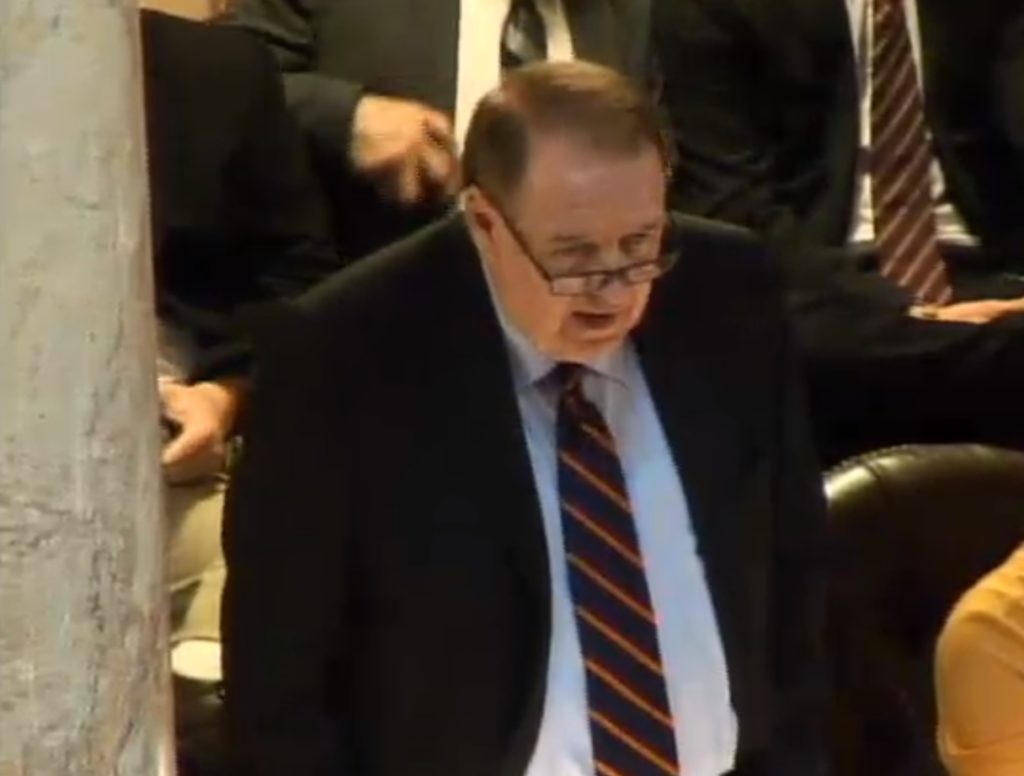Codey and Sweeney Clash Angrily over Senate Prez's Casino Tax Modification Bill

Senator Dick Codey (D-27) and Senate President Steve Sweeney (D-3) locked horns hard this afternoon over S2400, a Sweeney-authored casino tax modification bill that allows full deduction of promotional gaming credits and coupons from gross revenues and appropriates $100 million of federal funds to EDA for small business assistance.
"The goal of this bill is to get this industry up and running... right now they're not generating much of anything," Sweeney said. "We want them to succeed."
Codey objected, arguing that the legislation too specifically targets casinos, while workers everywhere are suffering though the CPVID-19 crisis. Sweeney slapped back, telling Codey he wished the senator had applied the same rationale to the $30 million break he gave to the horse racing industry.
Codey snapped back, "That was totally off the bill."
"We're talking about taking money and putting it somewhere else," said Sweeney. "The initial bill had it at $66 million; we reduced the fees... it's dramatically less."
"The high roller tax is deferred," said Codey. "You're getting zero. No money at all is coming from those taxes."
"I wish you would listen to me when I said what I said," Sweeney shot back.
"Oh, I heard you quite well."
"I don't appreciate you saying I lied," Sweeney said.
"The optics aren't too good, sir," Codey persisted. "For a year they're not paying it."
"This is nothing new," Sweeney said.
Senator Nia Gill (D-34) joined Codey with some hard questions. So did state senator Shirley Turner (D-15). "This pandemic has hurt everybody not just the casinos," said Turner, who opposed the bill. "I think we should be fair in letting everybody get their feet back on the ground."
State Senators Steve Oroho (R-24) and Mike Testa (R-1) stepped in to offer their support. "We need casinos to be dealt with separately, because the state has layered special tax upon special tax," Testa said.
The bill passed.
The vote tally was 27-4.
The bill provides for temporary modifications to the payment and use of certain casino gaming taxes and fees due to the COVID-19 Public Health Emergency and State of Emergency declared by the Governor in Executive Order No. 103 of 2020. This bill also amends current law concerning the use of promotional gaming credits by casino licensees and their deduction from gross revenues.
The bill allows for certain licensing and other fees imposed on casino licensees, that are deposited to the Casino Control Fund (CCF), to be deferred during the period the licensee’s casino hotel facility remains closed due to the emergencies, and during the six-month period immediately following the date that the casinos are permitted to reopen after the emergency declarations. The annual license fee on each slot machine would be entirely waived from July 1, 2020 through June 30, 2021, inclusive. The deferment or waiver would not apply to any fees imposed on a casino licensee or its Internet gaming affiliate for the issuance or renewal of any Internet gaming license or permit, or to any amounts required to be deposited in the CCF from Internet wagering inactive or dormant accounts.
The bill requires any surplus funds held by the Division of Gaming Enforcement in the CCF, or held by the division due to an overpayment of the investment alternative tax in the case of a downward adjustment of the casino licensee’s audited gross revenues, to be returned to the casino licensee within a specified time period.
The bill also waives, for a period of 24 months beginning on the date that the casinos are permitted to reopen, the provisions of law requiring the imposition of a minimum charge of $3.00 and minimum fee of $3.00 for any parking space in a casino parking garage. In addition, the bill waives certain hotel room fees related to casino gaming for the remainder of CY 2020. The fee of $3 per day on each hotel room in a casino hotel facility that is occupied by a guest, and the fee of $2 per day on each occupied room in a casino hotel and fee of $1 per day fee on each occupied room in a non-casino hotel in Atlantic City, are waived for the remainder of CY 2020.
This bill provides for a reduced tax liability on casino gross revenue tax and investment alternative tax obligations for brick-and-mortar casino properties reopening following their closure due to the COVID-19 emergency declarations. The reduced tax liability would be in effect during the 24-month period commencing on the date that the casinos are permitted to reopen after the declarations and ending on the last day of the 24th month thereafter. To remain eligible to receive the tax liability reductions, the bill requires each casino licensee to submit certain information to the State Treasurer and the Division of Gaming Enforcement, at the same time that the reduced tax payments are made.
This bill amends current law to permit each casino licensee to take a deduction against gross revenues equal to the full amount of promotional gaming credits, including match play and table game coupons, that are issued by the licensee and redeemed its patrons. Currently, casinos are permitted to take such deductions only for the amount of promotional gaming credits redeemed in a tax year that exceed $90,000,000. This bill also removes the division’s ability to limit the negative fiscal impact of the promotional gaming credit deduction on the Casino Revenue Fund (CRF).





